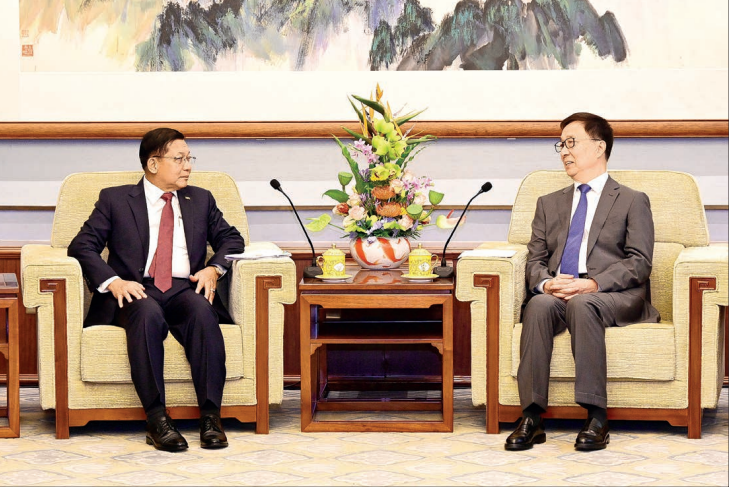General Min Aung Hlaing is the real winner at the Tianjin meeting
At the Shanghai Cooperation Organisation summit in Tianjin, China refers to the general as the “acting president of Myanmar”, enhancing the military junta’s credentials. For its part, India plans to send a delegation to monitor Myanmar’s December elections, after signing several new economic agreements with its neighbour. Xi Jinping promised to admit Myanmar as a full SCO member, consolidating Myanmar's integration into Chinese-led regional platforms.
Tianjin (AsiaNews/Agencies) – Myanmar's military regime gained further legitimacy by participating in the latest Shanghai Cooperation Organization (SCO) summit, held on Monday in Tianjin, northern China.
General Min Aung Hlaing, responsible for the 2021 coup that sparked Myanmar’s ongoing civil war, has received significant diplomatic recognition not only from Beijing but also from New Delhi.
Min Aung Hlaing's high-profile welcome in China included not only red carpets and glittering limousines, but also his formal recognition as head of the government of the former Burma.
For the first time since the 2021 coup, the Chinese Ministry of Foreign Affairs referred to him as “acting President of Myanmar" rather than "Leader of Myanmar", a term Beijing used in the past four years in order to maintain greater strategic ambiguity.
For many observers, this decision legitimises Min Aung Hlaing's political plans, particularly those related to the national elections scheduled for December in some 300 constituencies, many of which are under the control of the armed groups that make up the anti-coup resistance forces.
So far, only 145 of 330 townships have been surveyed.
According to outside observers, these elections are a sham, given that Myanmar’s military controls only a portion of the territory and continues to fight against various ethnic armed forces opposed to the military regime.
Precisely for this reason, however, the support of Asian powers like China and India is important to the military junta: while losses on the ground mount, General Min Aung Hlaing can still claim to have a grip on power.
After meeting with Indian Prime Minister Narendra Modi at the SCO summit, the Myanmar government announced that New Delhi will send its own team of observers to monitor the election process.
“At the meeting, they exchanged views on measures to ensure peace and stability in the border regions of both countries, trade promotion, enhancement of friendship and cooperation,” wrote the state-run Global New Light of Myanmar newspaper.
Modi stressed the need for free and fair elections, but at the same time, according to statements from the Myanmar government, bilateral discussions touched upon economic cooperation, particularly over rare earths, which Myanmar is rich in, as well as energy production and security.
India's statements appear to reflect a strategic realignment toward Myanmar, which has been under the exclusive influence of China so far.
Min Aung Hlaing's participation in the SCO summit saw at least seven memoranda of understanding signed with China, involving Burmese and Chinese companies, especially businesses linked to Myanmar’s military and those working along the Belt and Road Initiative, the mega-infrastructure project Chinese President Xi Jinping launched in 2013 to connect China to the rest of the world.
Even in this case, experts note, it is likely that some of the deals received tacit support from India, particularly the extension of the Stilwell Road (formerly Ledo Road), which links northeastern India to China via the Pangsau Pass in Myanmar.
But the most significant achievement for Min Aung Hlaing remains Xi's promise to include Myanmar as a full member of the Shanghai Cooperation Organization.
“I would like to express my gratitude for the peaceful conditions that have emerged due to China’s efforts in exerting pressure on the armed groups in the border regions for the development of northern Myanmar,” Min Aung Hlaing said during the meeting, referring to the areas in Shan State currently under the control of ethnic militias, with which Beijing maintains various forms of cooperation despite their opposition to Myanmar’s military junta.
SCO membership would allow Myanmar to be further integrated into Chinese-led economic and security platforms.
In exchange for Myanmar's membership in this political project, China would boost the development of infrastructure and economic-industrial activities that serve China's strategic interests (such as rare earth mining, which is almost entirely under Beijing's control regardless of whether the mining sites are run by the military or ethnic militias).
12/02/2016 15:14
30/07/2025 14:56







.png)










